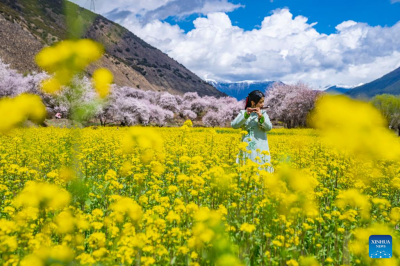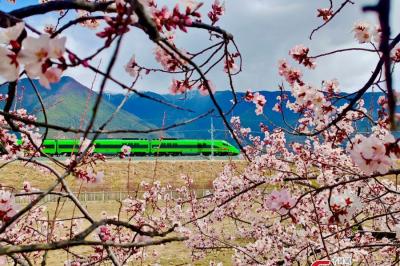Eco-protection subsidy Tibet, covered by a variety of plants, including ancient woodlands, grasses, and shrubs, is defined as a "State-level ecological shield" by the central government. Two years ago, the regional authorities adopted the central government's preferential environmental protection policies and published the 13th Five-year Plan for Ecological Protection Subsidies in the Tibet autonomous region (2016-20). The plan echoes the Compensation Fund for Forest Ecological Benefits released by the Ministry of Finance in 2004, and encourages poor farmers and herdsmen to work as rangers to protect the region's forests, grasslands, nature reserves, streams, rivers and lakes. Last year, the central government allocated more than 9.35 billion yuan to pay 700,000 rangers, which benefited more than 2 million households. "It's essential to balance poverty alleviation work and ecological protection, because the environment is crucial to Tibet's economic development," said Norbu Dondrub, from the regional standing committee. According to Lu Huadong, the other deputy director of the Tibet Leading Group Office of Poverty Alleviation, the program provides real work for people in need. "We offer jobs to impoverished people who are able to work, and provide an income of 3,000 yuan a year. Like the State's environmental protection policy, the program reaches those who need stable incomes and it delivers genuine results," he said. Dadrin, a 52-year-old former herdsman from Maldrogungkar county, Lhasa, has been a forest ranger for about 13 years. "In 2004, we were offered jobs that provided a stable income after the central government released a policy to employ rangers to help protect the environment," he said. "I was very happy. When I was raising yaks I could only earn 1,000 yuan to 2,000 yuan a year, while my wife and children stayed at home because they couldn't find work. Times were hard." Dadrin, who like many Tibetans only has one name, said about 160 impoverished people in Maldrogungkar were initially recruited as forest rangers, but more people were employed in 2016. "I earn 3,000 yuan per year. I also raise yaks and do some part-time work in my free time, so I can make about 12,000 yuan a year now," he said. "The only problem is the inadequate insurance cover. Patrolling the forest is dangerous work as wild bears and other animals can appear very suddenly. But I believe things will improve and our lives will become even better soon." While the situation is improving, there is still much to be done, according to Norbu Dondrub. "More than 400,000 people in the region still live in poverty, and 4,456 villages in 69 districts and counties have yet to see the situation improve. It will be hard work to lift all those people out of poverty by 2020," he said. Developing industries based on local resources will remain a priority for the regional government this year, along with solving problems that have emerged in the application of preferential policies designed to help residents. "Government-sponsored programs, including raising yaks, bottling spring water and producing hand-woven goods, are still small-scale ventures, and some of the new products are not very competitive in the market," said Zeng, from the Tibet Leading Group Office for Poverty Alleviation. "Tibet's financial market is still in its infancy and requires much improvement, especially in terms of debt-repayment programs. "We offer preferential policies to entrepreneurs and companies, but the market is still not as active as those in other provinces and regions." He stressed that the people of Tibet are the crucial element in the fight against poverty, and more educational and health projects will be launched this year to enable them to earn more money and improve their standard of living. By: Cheng Si/Daqiong |
- Home
- News |Tibet |Exclusive |China |World |Related News |Latest
- Documents |White Papers |Others
- Photo |Politics |Economy & Society |Culture & Religion |Human & Nature |Beautiful Tibet |Other Tibetan-Inhabited Area |Exchanges |Related
- Video |News |Documentary |Micro-Video |Entertainment
- Art
- Tourism
- In Focus
- About Tibet






